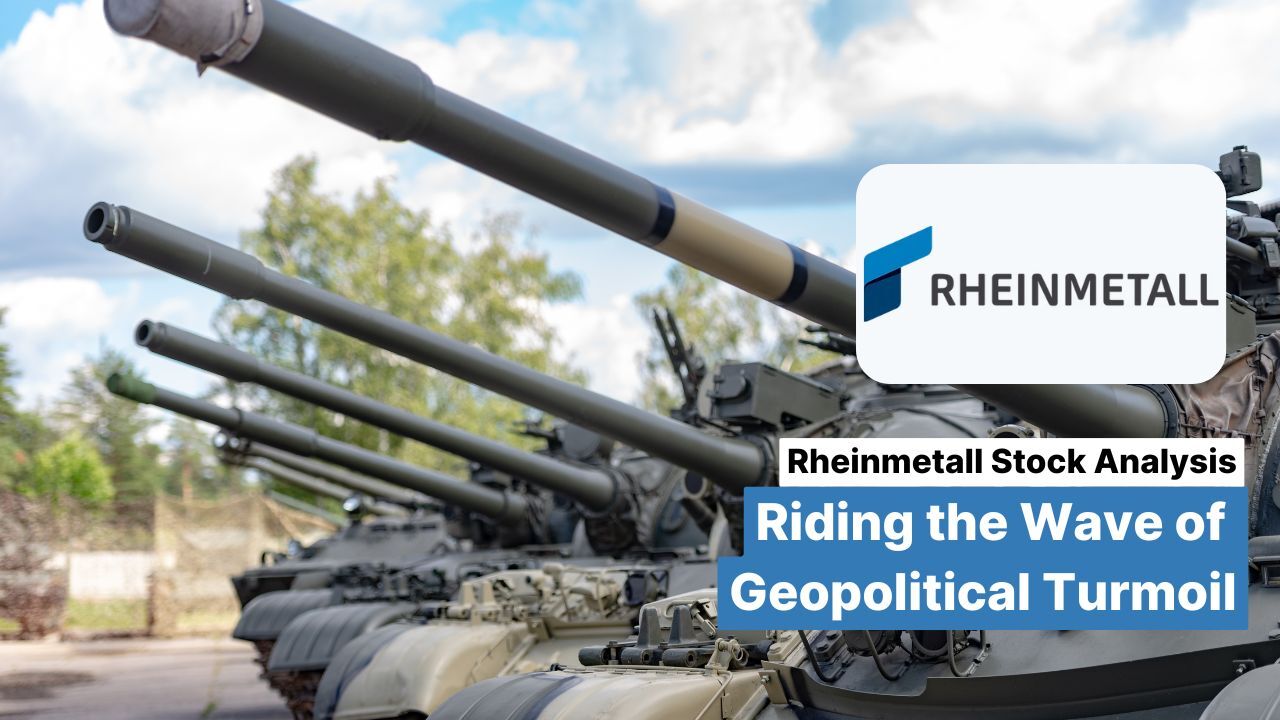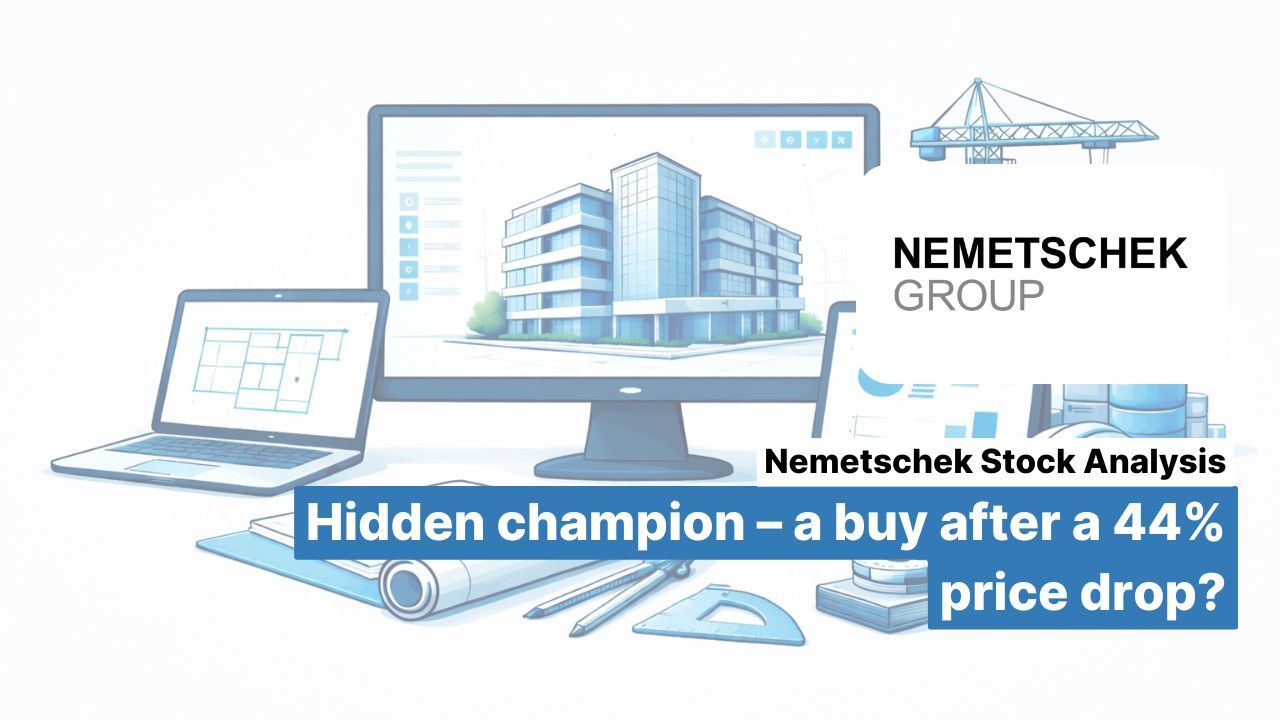Table of Contents
- Company profile - European defense contractor
- Rheinmetall´s market and competition
- Is Rheinmetall an ethical investment?
- Rheinmetall's latest quarterly figures for March 2025
- Rheinmetall stock forecast 2025
- Key figures for Rheinmetall stocks from the HGI analysis
- Assessment of Rheinmetall stocks
- Conclusion on Rheinmetall stock
The global security landscape has undergone a fundamental transformation in recent years. New threats – ranging from conventional military conflicts and asymmetric warfare to cyberattacks and hybrid operations – have altered the strategic thinking of many countries. In particular, Russia's war of aggression against Ukraine has triggered a security policy shift in Europe. Numerous countries are responding with massive increases in their defense budgets, the development of modern armed forces, and a return to national defense capabilities. In this geopolitical realignment, the defense sector is once again playing a central role.
Companies such as Rheinmetall (ISIN: DE0007030009) are therefore more than ever the focus of political, social, and economic interests. The group, which has traditional roots in the German and European defense industry, has consistently positioned itself in recent years as a system supplier for defense and security technology. With a clear focus on core military areas such as armored vehicles, weapon systems, ammunition, electronics, and sensor technology, Rheinmetall is benefiting directly from the current rearmament policy of many Western countries. And the stock is skyrocketing. Over three years, the stock price has increased more than ninefold.
Source: Rheinmetall stock price
Rightly so or not? Fundamentally, there are at least some arguments in favor of the stock. The following analysis of Rheinmetall stocks aims to clarify whether there is still potential and whether the stock could be expensive or cheap in the current environment. It analyzes Rheinmetall's latest operating performance, its positioning in the international competitive environment, and its financial valuation based on growth-oriented key figures. It becomes clear that the group is not only benefiting from a historically high order intake in the short term, but is also operating in a structurally growing market in the long term – albeit not without risks.
💡 In a nutshell
- Rheinmetall stocks are considered to be the biggest beneficiaries of a new geopolitical world order
- High growth is convincing, and huge order books give cause for hope.
- However, the valuation already anticipates a great deal
Company profile - European defense contractor
With a market capitalization of around €60 billion, Rheinmetall is one of Europe's largest defense contractors. Two-thirds of its business is generated in Europe, with Germany accounting for around one-third of its total sales.
The Düsseldorf-based company's business model is based on the development, production, and sale of military and civilian technologies. Military equipment and system integration account for the majority of product sales. The operating business is divided into several core segments, each of which addresses specific competencies and products. These are Vehicle Systems, Weapon and Ammunition, Electronic Solutions, and Power Systems.
Source: Rheinmetall annual report 2024
Segment Vehicle Systems
In the Vehicle Systems segment, Rheinmetall focuses on armored and unarmored wheeled and tracked vehicles for military applications. With sales of €3.8 billion, it is the largest segment and accounts for around 39 percent of total sales.
Specifically, it offers armored personnel carriers such as the Puma, transport vehicles in the HX series, and special solutions for international armed forces. In addition to manufacturing, Rheinmetall also handles maintenance, modernization, and system integration. Demand is high due to the new threat situation in Europe. Segment sales rose accordingly by 45 percent in 2024.
Weapon and Ammunition
The second major segment, Weapons and Ammunition, is no less interesting, with sales of €2.8 billion in fiscal year 2024. It comprises a wide range of weapons, ammunition, and weapon systems for the army, navy, and air force. These include medium- and large-caliber guns, mortar systems, air defense systems, and the corresponding ammunition.
Rheinmetall offers complete solutions ranging from individual products to networked weapon systems and works closely with government procurement agencies. In 2024, sales in this area rose by almost 60 percent. What is interesting about this is that these are fast-moving consumer goods. They have to be repurchased after use.
Power Systems
With a stock of around 21 percent of sales, Power Systems is the third-largest segment. It specializes in drive and energy systems for military and some civilian applications. These include diesel and gas engines, generators, and energy-efficient solutions for mobile platforms and stationary systems. In 2024, it was the only segment to report a decline in sales.
Electronic Solutions
The situation is different in the smallest segment, Electronic Solutions. Here, good growth was also reported with a 31 percent increase in sales. Sales of 1.7 billion euros correspond to just under 18 percent of total sales.
The company develops sensor, guidance, and communication systems, fire control systems, and electronic reconnaissance and protection systems. These products are designed to enable networked operations and equip soldiers with precise real-time information and electronic protection. Simulation and training technologies also fall within this area.
Rheinmetall´s market and competition
The defense market differs from traditional industries in many respects. It is heavily dependent on political decisions and security policy conditions. Demand for defense equipment is driven less by short-term market mechanisms and more by strategic assessments of threat situations, international conflicts, or alliance commitments, e.g., within NATO. In addition, market access is highly regulated and subject to high barriers to entry. Only companies with security-related approvals, government licenses, and many years of experience can operate successfully in this sector. Rheinmetall is one of them and benefits from its established position and reputation as a reliable partner to the public sector. It is precisely this fact that constitutes a deep moat.
Another special feature of the market is the long-term nature of the projects. Defense programs often span decades, from development and production to maintenance and modernization. Such long cycles mean a high degree of planning security, but also require a stable political environment. In addition, the defense market is strongly influenced by export controls and political approval procedures. Defense companies operating internationally must comply with both national and international regulations. The social debate on arms exports and ethical responsibility, which I will discuss later, should not be underestimated.
Due to the isolation of the markets, competition is low in many submarkets, as only a few suppliers are capable of developing and delivering complex military systems. At the same time, however, the technological requirements are also very high. Innovative solutions are required that function reliably under the toughest conditions – whether in the field of sensor technology, communications, drive technology or protection systems. This is precisely where the competition is divided, with local players enjoying a home advantage due to the particular market isolation.
Rheinmetall's main competitors are primarily based in Europe, the US, and Israel. They operate in similar technology fields and compete for government contracts in the areas of land vehicles, weapon systems, electronics, and ammunition. In Europe, for example, Krauss-Maffei Wegmann (KMW) is one of the most important competitors, particularly in the field of armored vehicles. Together with Rheinmetall, KMW operates the joint venture KNDS (KMW+Nexter Defense Systems). Nexter, the French partner in KNDS, is also a relevant European competitor, particularly in artillery systems and wheeled armored vehicles. Another important European competitor is BAE Systems from the UK. The company is active in almost all areas of defense technology, from armored vehicles and electronic warfare to submarines. Looking to the Middle East, Elbit Systems from Israel is a company that specializes in electronics solutions, unmanned systems, and modern fire control technologies. Leonardo from Italy and Saab from Sweden are also competitors in individual areas such as sensor technology, radar systems, and guided missile technology. Both are heavily involved in European defense projects.
Source: Rheinmetall market cap
All European defense companies have performed well recently. However, Rheinmetall's strong performance stands out, as a glance at the changes in market capitalization shows.
Let's take a quick look across the pond: In the United States, companies such as General Dynamics (e.g., with the Stryker armored vehicle and the Abrams battle tank) and Northrop Grumman compete with Rheinmetall. Thanks to the large US defense budget, both US companies have a particularly large order volume and are also very active on the international market. However, the majority of their sales are generated in the US.
Is Rheinmetall an ethical investment?
As briefly mentioned above, investing in Rheinmetall raises ethical questions. Critics point out that arms exports to countries in conflict or with questionable human rights records can be problematic. Proponents, on the other hand, emphasize that the arms industry contributes to national security and international peacekeeping, especially in defense alliances such as NATO. For investors, however, the question always arises as to whether they can reconcile financial opportunities in the geopolitical situation with ethical concerns. In terms of geopolitical stability and the protection of liberal democratic values, an investment in arms may therefore appear to be a viable option. Ultimately, this is a question that every investor must answer for themselves.
Rheinmetall's latest quarterly figures for March 2025
Rheinmetall significantly increased its sales and earnings in the first quarter, clearly exceeding capital market expectations. Specifically, the Group generated sales of €2.3 billion, an increase of around 46 percent compared with the same quarter last year. The military business performed particularly well, with sales up by almost 73 percent. Progress was also made on the earnings side. Operating profit rose by 54 percent, outpacing sales growth. At 7.8 percent, the operating margin was slightly above market expectations.
Source: Financial data from Rheinmetall
The military sector was the main driver, with growth of around 96 percent. The positive business development is therefore exclusively attributable to the defense business. So-called pull-forward effects also played a key role here. The forward shift of sales and earnings from the second to the first quarter helped to boost momentum.Particularly noteworthy is the sharp rise in order intake of around 181 percent to €11 billion, which is mainly attributable to new major orders from Germany. The order backlog reached a new all-time high of around €62.6 billion. It is expected to rise further.
Rheinmetall stock forecast 2025
Against the backdrop of strong developments, the Executive Board confirmed its forecast for the full year 2025 in its latest ad hoc announcement. It anticipates sales growth of 25 to 30 percent and an operating margin of around 15.5 percent. However, this forecast does not yet take into account the additional market potential that should result from the latest geopolitical developments in Europe, Germany, and Ukraine. An adjustment of the forecast in the further course of the year cannot therefore be ruled out.
At over €60 billion, the order backlog is at a historic high. Given the enormous sums that the German government is now investing in rearming Germany and the high budgets behind the ReArm plan from Europe, the momentum is unlikely to slow down. In an interview with Handelsblatt, Rheinmetall CEO Armin Papperger spoke of potential orders worth up to €300 billion by 2030.
Analysts are similarly positive. The threat is too real and the will to increase national defense budgets is too strong. This is likely to be reflected in sales growth in the coming years. Sales are expected to rise by a high double-digit percentage, from 9.8 billion euros in 2024 to just under 30 billion euros in 2029. Margins are also likely to increase.
Source: Rheinmetall stock forecast
Analysts expect EBITDA to rise from €1.8 billion in 2024 to just under €7 billion in 2029. The corresponding margin is expected to increase from 18 to 23 percent.
Key figures for Rheinmetall stocks from the HGI analysis
The HGI score (High Growth Investing Score) serves as a rating system for high-growth companies and is based on a combination of fundamental indicators that are particularly relevant for dynamic and high-margin companies. Rheinmetall shares currently have a score of 10 out of 18 points, which initially indicates a solid but not exceptionally strong growth profile – especially when compared to typical technology or software companies, which often achieve higher scores in this rating model. However, the stock is anything but a disruptive technology company. This is important to understand in the analysis. But now let's take a closer look at the individual key figures.
Source: HGI-Score of Rheinmetall
The EV/sales multiple is relatively high at 8.1, earning two out of three points. The same number of points were awarded for the Rule of 40 score, revenue growth, debt ratio, and PEG ratio. Rheinmetall achieved a score of 46 percent on the Rule of 40 score, which combines revenue growth and profitability. This was mainly due to strong revenue growth, which was almost 36 percent on a 12-month basis (TTM) and even gained significant momentum recently. The sales figures reflect the strong expansion in the military sector, especially compared to previous years, when growth was around 12-13 percent. The debt ratio is also healthy and only moderate at 0.5. Rheinmetall is therefore in a solid financial position.
Source: Balance sheet Rheinmetall
However, the company does have some debt due to its capital-intensive business. Long-term liabilities will amount to €3.4 billion in 2024, with total debt exceeding €10 billion. The equity ratio is only 30 percent. Nevertheless, strong growth in sales and profits give cause for optimism, with free cash flow exploding to almost €1 billion in 2024.
Back to the valuation. Based on the revenue multiple, Rheinmetall is only moderately valued as a growth investment. However, the PEG (price-earnings-growth ratio) is also not high at 1.6, which earns two points in the HGI analysis. Values below one are generally considered favorable, while values above 1.5 or 2 may still be attractive for fast-growing companies. Rheinmetall is therefore still in an interesting range for a growth company. Only the gross margin of 23 percent did not earn any points. This shows once again that, despite strong sales and earnings figures, Rheinmetall has comparatively low-margin products, which is typical for the highly capital-intensive and cost-driven defense industry.
Assessment of Rheinmetall stocks
We have already explained that Rheinmetall is not a classic growth investment. Nevertheless, it is traded as such. The high growth may be convincing in the short term, but what about the long term?
Source: Rheinmetall key metrics
Measured against traditional valuation metrics, Rheinmetall is therefore ambitiously valued. The price-earnings ratio (P/E) based on the last twelve months is 103. Such a high P/E ratio indicates that the market is already pricing in strong future earnings growth. In a normal environment, such a P/E ratio would be difficult to justify, but given the geopolitical developments and the rapidly growing order backlog, investors see significant profit potential. Looking back, this figure is also higher than in the past.
Source: Rheinmetall Price/ Earnings
The EV/free cash flow (EV/FCF) multiple is also very high at 80. It indicates how many years it would take for current free cash flow to justify the total market value including debt (enterprise value of €79 billion). A value significantly above 20 is generally considered expensive, especially for established industrial groups. However, this also reflects the fact that investors are strongly focusing on future scaling and margin improvements – especially when one-off effects in cash flow normalize or large orders are settled more quickly.
On the other hand, there is strong revenue growth of 36 percent. This may justify the high multiples, at least in part. A peer comparison also shows a clear outperformance with revenue growth rates more than twice as high.
Source: Rheinmetall Revenue growth
Since growth is based on solid operating performance in the military sector, it is likely to continue as long as geopolitical tensions persist. At least, that is what the market expects. The valuation signals strong growth in future earnings and cash flows. These are very concrete, meaning they are highly likely to materialize. Rheinmetall is currently considered the structurally strongest beneficiary of geopolitical upheaval. And that is precisely what investors are rewarding with hefty valuation premiums. However, these also harbor a certain downside risk should growth fall short of expectations. It should also not be forgotten that this is a politically driven rally. And such rallies are often short-lived. In other words, what suddenly began in Ukraine could also end quickly. And without war, defense spending is unlikely to rise as sharply as some investors expect.
Conclusion on Rheinmetall stock
Rheinmetall is excellently positioned to benefit from the security policy upheavals in Europe and beyond. The first-quarter figures impressively demonstrate how dynamically the business is developing: significant double-digit growth in sales and earnings, a historically high order backlog, and strong demand for military equipment mark a turning point in the company's development. According to the CEO, who sees potential orders worth €300 billion by 2030, this trend is set to continue.
Despite high valuation multiples such as an ambitious P/E ratio and EV/FCF, market expectations are understandable, as Rheinmetall is considered one of the key suppliers to the Western alliance and operates in a structural growth market. The high visibility provided by long-term orders and political backing give the business model stability and planning security. At the same time, however, the stock remains vulnerable to political decisions, regulatory restrictions, and possible project delays. For investors who are betting on long-term, geopolitically driven growth, Rheinmetall therefore offers an interesting, albeit not risk-free, investment profile. Analysts currently believe that the opportunities outweigh the risks.
Source: Rherinmetall target price
Around 89 percent recommend buying the stock, while the remaining 11 percent advise holding it – a clear majority therefore sees further potential. The average target price is €1,704, which is around 0.6 percent above the current price. This means that some of the upside could already be priced in. Rheinmetall now needs to deliver and fuel investors' imagination so that the stock can continue to rise.
🔔 If you would like to receive new investment ideas and free stock analyses selected according to the Levermann, High-Growth Investing or Dividend strategies by email every week, you can now subscribe to our free StocksGuide newsletter.
The author and/or persons or companies associated with the StocksGuide own or may own stocks in Rheinmetall.
This post represents an expression of opinion and not investment advice. Please note the legal information.




